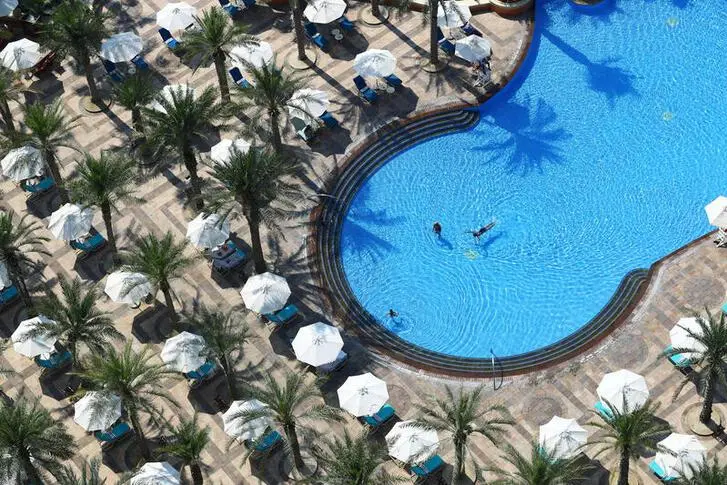PHOTO
Dubai’s tourism and hospitality sector has shed much of its workforce following the coronavirus outbreak and the industry will take years to recover to pre-pandemic activity levels, with some hotel owners now facing a fight for survival.
The emirate’s tourism sector was already in the doldrums prior to covid-19 as growth ebbed. Dubai will miss its longstanding target to attract 20 million international visitors annually by 2020, peaking at 16.7 million in 2019. That failure led to an oversupply of hotel rooms, which have nearly doubled in number since 2010. Including hotel apartments, these totalled 126,120 in 2019 as 25 new hotels opened last year.
Average daily room rates were falling about 10 percent annually before the pandemic brought the sector to a halt with the UAE’s suspension of all international flights in late March.
In response, hotel companies have slashed staff at headquarters, with employees uninvolved in generating revenue such as business development let go. Hotels that were shut or operating at vastly reduced capacities retained a skeleton workforce.
“Hotel operators have put staff on compulsory unpaid leave or reduced pay to soften the financial blow and to ensure they have access to their trained personnel and don’t have to recruit afresh,” said John Podaras, a partner at Dubai’s Hotel Development Resources.
A 25-50 percent decline in hotel revenues can translate into a 60 percent drop in profits, his firm estimates.
“When you look at those figures, you see that in order to survive hotels have to make drastic cuts unless they’re not highly leveraged and have large cash reserves,” said Podaras.
A Dubai Chamber of Commerce survey of small businesses published in mid-May found that almost three-quarters of travel and tourism companies expected to go out of business within a month.
“In the short term, we have numerous challenges both at a hotel owner level and a hotel operator level,” said Gaurav Sinha, founder and CEO of Dubai-based Insignia Worldwide, a travel, tourism and hospitality consultancy.
“Owners have funded building hotels through borrowings, which may need to be restructured and could cause sector consolidation – there’s some great hotels that investors might be able to buy for bargain prices.”
Under-development projects will likely be slowed, although developers’ scope to delay will depend on their financial obligations. Following the financial crisis, several residential and office buildings were converted into hotels. Now that process could be reversed, with hotels repurposed for other uses.
“Some hotels will close permanently. Smaller hotel operators are especially vulnerable, with many owners unable to continue funding them,” said Podaras. “It’s difficult to estimate the likely number of hotel closures because markets like Dubai are totally dependent on international air travel.”
Changing business models
Dubai reopened to international business and leisure visitors from July 7. Those undeterred by the mandatory covid-19 screening test on arrival at Dubai airports will find a different hotel sector to before the pandemic.
“Hotels’ business model has changed,” added Podaras. “Back in the good old days, the margins were so high, owners were able to build massive, impressive spaces such as hotel lobbies and atriums. All that is changing, with owners looking to generate revenue from every square metre of their property. The big reception areas are being turned into cafes or event spaces. Hotels are being repurposed to maximise revenue.”
Dubai’s economy will contract 4.9 percent in 2020, Moody’s forecasts. Government-related leisure and entertainment operators, which include the likes of Jumeirah group and DXB Entertainments, have debts of at least $3 billion, according to Moody’s.
“In the medium term, one of the big challenges is that some of Dubai’s major growth drivers over the past 10-20 years were travel, tourism and transportation, and we’re now looking at several years at least before these sectors will return to 2019 levels,” said Thaddeus Best, a Moody's Analyst. “There will be a lasting impact on the labour market.”
Late 2020 will prove a crunch moment for Dubai’s tourism sector. A second wave of coronavirus in Europe, the key winter source market, could wreck the industry’s recovery hopes. Europe’s diverging – and often confusing - approaches to travel quarantines could deter residents from holidaying abroad, especially beyond the continent.
Creativity is crucial
In order to woo tourists, Dubai’s hospitality firms will have to be creative, with luxury resorts reluctant to cut prices for fear of diluting their brand value.
“Some of the region’s aspirational brands will create packages with extra value-added benefits without necessary reducing prices,” said Sinha. “You’ll get a lot more for your money, but that doesn’t mean it’ll be cheap.”
The pandemic could also inspire policy changes to make it easier to visitors to travel to the UAE such as easing visa requirements.
“The crisis will spur great innovations in the tourism sector. Destinations based on wellness and nature are likely to be the first to recover, while big urban hotels within city blocks and/or business districts will struggle,” added Sinha.
“They’ll have to rethink hotel design to create a seamless, touchless experience in luxury hospitality, which makes it a fertile time for innovation. The evolution we were anticipating over the next 10-15 years in hospitality will now happen in 2-3 years.”
(Writing by Matt Smith, editing by Seban Scaria seban.scaria@refinitiv.com)
#DUBAI #HOTEL #HOSPITALITY #COVID19
Disclaimer: This article is provided for informational purposes only. The content does not provide tax, legal or investment advice or opinion regarding the suitability, value or profitability of any particular security, portfolio or investment strategy. Read our full disclaimer policy here.
© ZAWYA 2020




















